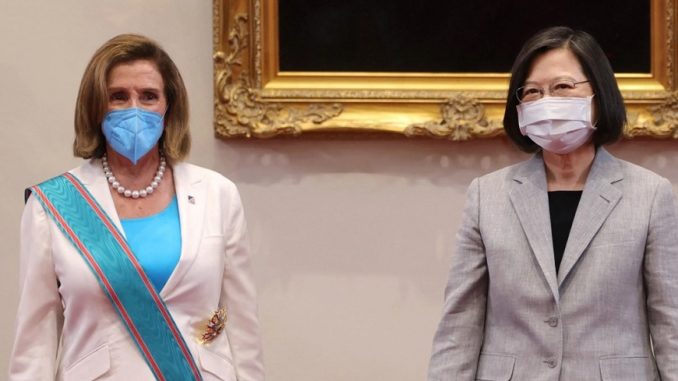
By: Luis Meiners ISL – US
Nancy Pelosi’s visit to the island stirred up the already tense relations between the world’s two main imperialist powers. China considers Taiwan as an integral part of its territory and has responded with military exercises and strong statements. Although the US formally recognizes its sovereignty, the visit can be seen as a new milestone in its rapprochement with the island.
The visit itself appears to have had more symbolic than practical value. But the absence of specific resolutions or tangible goals does not make it less important. Nancy Pelosi is the president of the US House of Representatives and as such is the next in the order of presidential succession after the vice president. It has been 25 years since a member of the US government of such a hierarchy visited Taiwanese soil.
The domestic front
Pelosi’s arrival in Taiwan was preceded by rumors and contradictory movements. She was originally going to travel to the Asian country months ago, but canceled after contracting Covid. A few days ago, newspapers in the US published that the trip would take place as part of a tour of Asia. China’s response was not long in coming and Xi Jinping himself warned that the US was playing with fire. Pressured by journalists, President Joe Biden said that the trip was not a good idea. These short circuits within the Democratic administration were used by the Republicans to criticize the government and show themselves to be tougher on China with an eye on the legislative elections in November.
These movements reflect the tensions and problems on the domestic front. There is no doubt that both Republicans and Democrats seek to position themselves electorally. Pelosi wants to show a strong leadership internationally at a time when polls ahead of the midterm elections do look favorable for her party. The Democratic administration suffers from not having been able to fulfill its campaign promises, aggravated by a context of high inflation that breeds discontent. Biden’s major legislative proposals fell through and his administration has lost the initiative. The Republican Party, for its part, has a more motivated base and seeks to regain control of Congress in November.
The external front
None of this, however, should make us lose sight of the context of growing inter-imperialist rivalry in which Pelosi’s visit took place. The tension between the two powers has been growing in the last decade. We have seen how the US has been reorienting its approach towards the Asian giant, moving from a policy that sought to subordinate China through its incorporation into the institutions of the world order hegemonized by the US, to a policy of containment and greater confrontation initiated with Obama´s pivot towards Asia. The politics of inter-imperialist rivalry and competition has become the strategic commitment of the entire establishment, from the Pentagon to both parties of the regime. That is why it has survived and deepened under the administrations of Obama, Trump and now Biden. With regards to Taiwan, this means that, while the US remains formally committed to the policy of “strategic ambiguity” (recognizing China’s sovereignty over the island but remaining ambiguous with regards to the independence of Taiwan), it has become more vocal in its defense of Taiwan.
China, for its part, seeks to strengthen its position as a world imperialist power and projects its power internationally. In recent times, it has been asserting its claim to sovereignty over Taiwan with increasing force. In October 2021 Xi Jinping publicly stated that the reunification with the island must be fulfilled. In recent months, there has been increasing Chinese military activity around the island, particularly through incursions of fighter jets into the island’s air defense space. Now, in response to Pelosi’s trip, the Chinese military will conduct multi-day military exercises around the island, using live ammunition, effectively blockading its maritime space.
We must not forget that these tensions also occur in a context marked by the brutal Russian invasion of Ukraine, which further fuels inter-imperialist disputes. It is clear that we live in a historical moment marked by the dispute for hegemony at the international level. These tensions are rooted in the dynamics of the world capitalist and imperialist system. Socialists must prepare for greater collisions, and also for the crises and opportunities that come with them.








